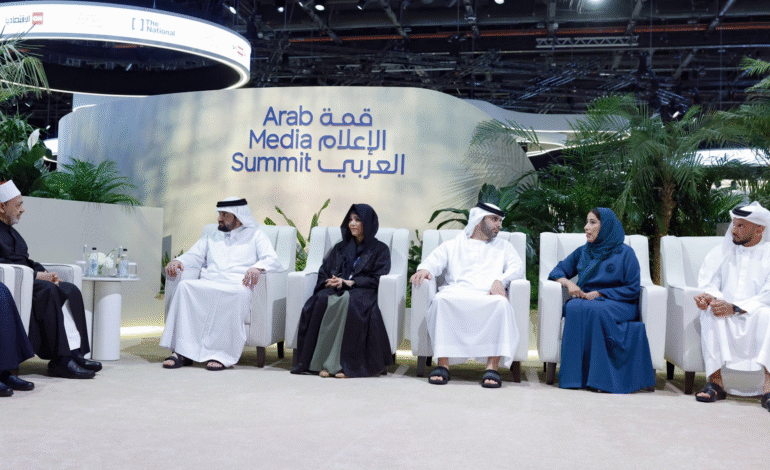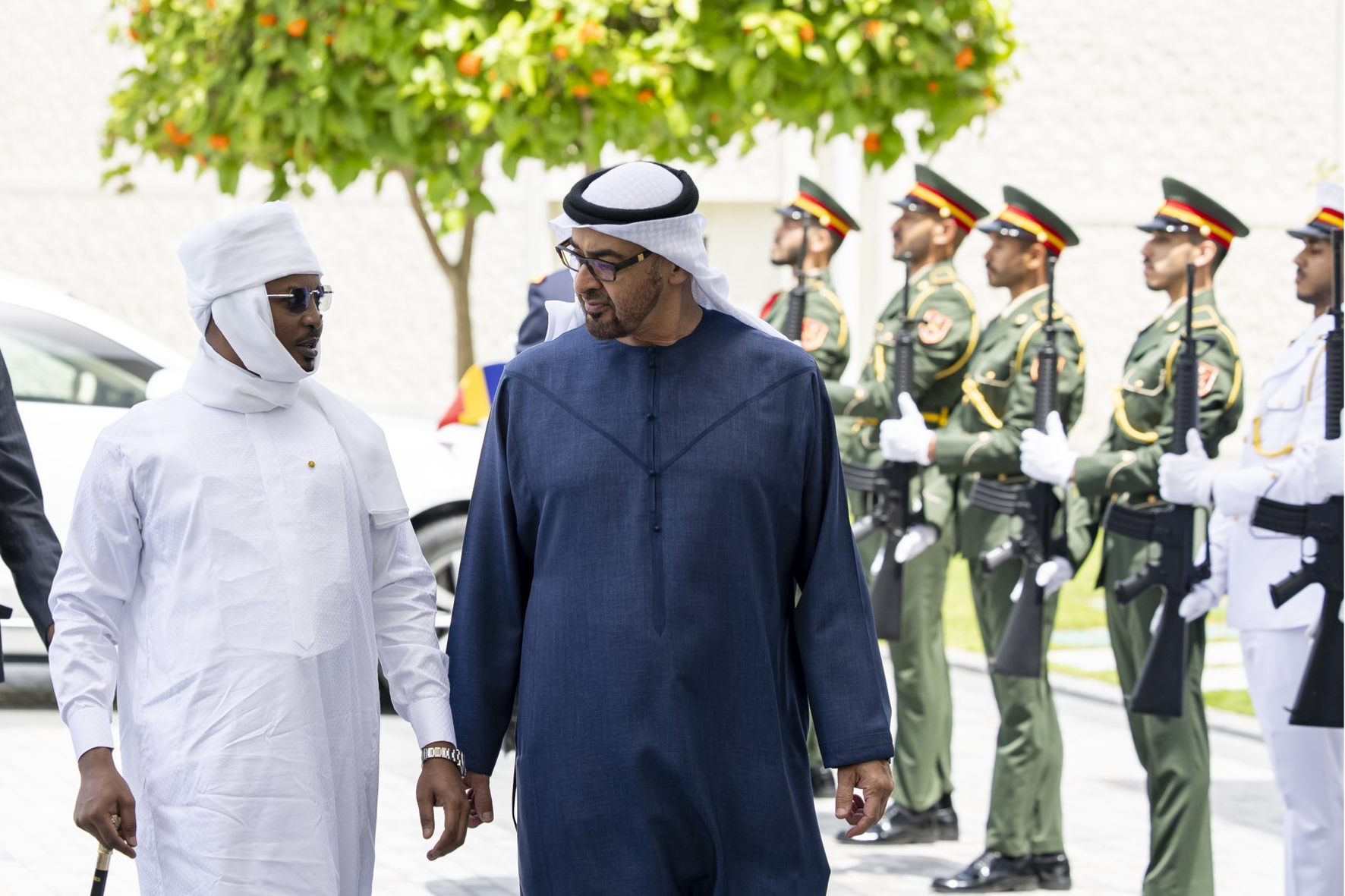Sheikh Ahmed, Grand Imam Al-Tayeb Promote Peace in Dubai

In a significant moment for interfaith dialogue and regional diplomacy, His Highness Sheikh Ahmed bin Mohammed bin Rashid Al Maktoum, Second Deputy Ruler of Dubai and Chairman of the Dubai Media Council, held an important meeting with His Eminence Professor Dr. Ahmed Al-Tayeb, Grand Imam of Al-Azhar and Chairman of the Muslim Council of Elders.
The meeting took place on the sidelines of the Arab Media Summit 2025 in Dubai, a venue that has grown into a platform for pan-Arab dialogue and international media cooperation. Their discussion centered around the vital role of promoting peace, Islamic values of compassion, and the need for a balanced, ethical media landscape.It also reaffirms Al-Azhar’s pivotal role as a religious institution championing authentic Islamic teachings rooted in coexistence and dignity.
A Warm Welcome Reflecting Shared Respect and Reverence
His Highness Sheikh Ahmed extended a heartfelt welcome to Grand Imam Dr. Ahmed Al-Tayeb, expressing wishes for his continued health, wisdom, and leadership. In his remarks, Sheikh Ahmed conveyed deep appreciation for the Grand Imam’s lifelong dedication to preserving and propagating the core principles of Islam. These include the values of compassion, wisdom, moral uprightness, and the pursuit of peace.
Dr. Al-Tayeb, who leads Al-Azhar, one of the most prestigious and oldest Islamic institutions in the world, has long been recognized for his scholarly contributions and moral leadership. The Grand Imam’s visit to Dubai, in itself, was a moment of mutual respect and recognition, highlighting the UAE’s leading role in fostering constructive religious discourse and cooperation.
Upholding the Message of True Islam in a Complex World
Throughout the conversation, Sheikh Ahmed praised Al-Azhar’s global standing and its responsibility in presenting Islam as a faith of peace, inclusion, and ethical integrity. Al-Azhar’s efforts in opposing extremism and in clarifying misconceptions about Islam to both Muslims and non-Muslims alike were highlighted as exemplary.
Sheikh Ahmed stressed that the values embodied by Al-Azhar’s mission are closely aligned with the UAE’s own principles. Both leaders discussed how Islamic teachings, when properly conveyed, serve as a strong counter-narrative to divisive ideologies, extremism, and cultural isolationism.
Advancing Shared Human Values Through Cross-Cultural Collaboration
The dialogue touched on a topic increasingly relevant in today’s fractured world: the need for countries and institutions to work together in advancing shared human values. Sheikh Ahmed and Dr. Al-Tayeb emphasized that dialogue among civilizations and religions is essential to peace and progress.
The UAE has established itself as a global crossroads for culture, religion, and innovation. It is a nation that believes in the power of communication and collaboration. Sheikh Ahmed reiterated that it is this spirit that guides the country’s international outreach, humanitarian policies, and interfaith initiatives.
Their discussion reaffirmed the role of platforms like the Arab Media Summit in amplifying these values. The summit facilitates open dialogue among media leaders, scholars, and policymakers to discuss issues of global concern, particularly those involving ethics, representation, and societal cohesion.
Empowering Media to Champion Ethical Narratives and Combat Extremism
A major focus of the meeting was the increasingly important role of media in shaping perceptions, ideologies, and behavior—especially among the youth. Sheikh Ahmed and Dr. Al-Tayeb both underscored the urgency of building media ecosystems that uphold truth, ethics, and cultural authenticity.
They discussed the prevalence of misinformation and harmful content, particularly narratives that distort Islam or incite division. Dr. Al-Tayeb warned against the consequences of media failing to distinguish between authentic religious values and extremist propaganda.
Sheikh Ahmed emphasized the UAE’s investments in media literacy and journalist training, helping build a generation of professionals who understand the gravity of their influence. Through programs, partnerships, and councils, the UAE encourages content creators and journalists to be agents of unity, not division.
UAE’s Enduring Global Efforts Under Visionary Leadership
Dr. Ahmed Al-Tayeb commended the leadership of His Highness Sheikh Mohamed bin Zayed Al Nahyan, President of the UAE, and His Highness Sheikh Mohammed bin Rashid Al Maktoum, Vice President, Prime Minister, and Ruler of Dubai. Their visionary leadership has played a transformative role in placing the UAE at the forefront of global humanitarian efforts, peace initiatives, and religious tolerance campaigns.
He specifically praised the UAE’s practical efforts to promote Islam’s authentic values, from local reforms to international partnerships. The country’s balanced and proactive approach was held up as a model for others in the Arab and Islamic world.
In past years, the UAE has established numerous institutions such as the Abrahamic Family House and the Ministry of Tolerance and Coexistence. These reflect the leadership’s intention to foster understanding among the world’s major religions and to create safe spaces for intercultural communication.
Commitment to the Islamic World and the Palestinian Cause
One of the most heartfelt moments of the discussion came when Dr. Al-Tayeb acknowledged the UAE’s consistent support for the broader Islamic world. He noted the country’s unwavering commitment to justice and solidarity, particularly in relation to the Palestinian cause.
He emphasized that the UAE’s support for Palestine is not only diplomatic and humanitarian, but also deeply symbolic of its larger dedication to protecting Muslim dignity and heritage. Sheikh Ahmed reaffirmed that the country would continue to support all rightful causes through moral, economic, and political means.
This dedication has been manifested through international aid programs, diplomatic advocacy, and high-level engagement with regional and global stakeholders who share the UAE’s peace-driven vision.
Distinguished Attendees Reflect a Unified National Vision
The presence of several senior Emirati figures at the meeting emphasized the national importance placed on such dialogues. His Highness Sheikh Mansoor bin Mohammed bin Rashid Al Maktoum, President of the UAE Olympic Committee, and Her Highness Sheikha Latifa bint Mohammed bin Rashid Al Maktoum, Chairperson of the Dubai Culture and Arts Authority, both participated in the meeting, symbolizing the UAE’s holistic approach to development and diplomacy.
Their involvement highlights how culture, sports, and youth engagement are also powerful tools for promoting values of peace and coexistence. By aligning national leadership across sectors, the UAE ensures that its values are carried forward through every sphere of public life.
Also in attendance were prominent media leaders including His Excellency Abdulla bin Mohammed bin Butti Al Hamed, Chairman of the National Media Office and Chairman of the UAE Media Council, and Her Excellency Mona Ghanem Al Marri, Vice Chairperson and Managing Director of the Dubai Media Council, and President of the Dubai Press Club. Their participation further highlights the importance of media in supporting national and religious harmony.
Arab Media Summit as a Convergence of Influence and Ethics
The Arab Media Summit provided a fitting backdrop to this landmark meeting. As a platform, it is designed to bring together journalists, policymakers, and thought leaders from across the Arab world. This year’s edition focused heavily on the ethical responsibilities of modern media, and the role of digital platforms in shaping collective consciousness.
Sheikh Ahmed and Dr. Al-Tayeb’s presence at the summit amplified its core message: that the media must be a tool of good, truth, and enlightenment. By aligning the spiritual voice of Al-Azhar with the practical framework of Dubai’s media institutions, the summit bridged both the moral and technical aspects of communication.
Strategic Path Forward for Media and Religious Institutions
The dialogue between Sheikh Ahmed and Dr. Al-Tayeb is likely to result in stronger collaboration between religious and media institutions. Initiatives may include the joint development of awareness campaigns, youth education programs, ethical journalism training, and international symposiums on religion and media.
As the digital age reshapes how communities form beliefs and opinions, both parties acknowledged that traditional institutions—be they religious or governmental—must adapt, innovate, and engage more effectively with younger audiences. Such collaborations will be critical to preserving cultural heritage, countering extremism, and fostering enlightened communities.
The strategic vision laid out during this meeting builds a blueprint for regional peace and global cooperation. By combining religious integrity with media sophistication, both Sheikh Ahmed and Dr. Al-Tayeb signal the beginning of a new era in how truth, tolerance, and tradition can be communicated worldwide.







